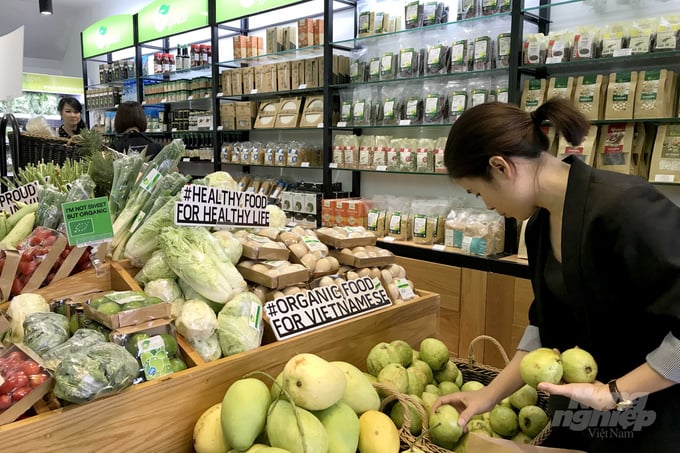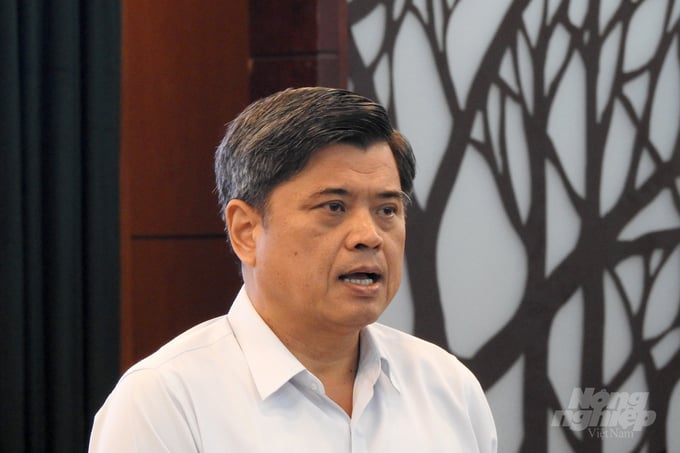May 18, 2025 | 14:29 GMT +7
May 18, 2025 | 14:29 GMT +7
Hotline: 0913.378.918
May 18, 2025 | 14:29 GMT +7
Hotline: 0913.378.918

Organic agricultural products and food at a store in Ho Chi Minh City. Photo: Thanh Son.
The Ministry of Agriculture and Rural Development held a workshop in Ho Chi Minh city on November 21 to review the 3-year implementation of Decree No. 109/2018/ND-CP on organic agriculture. Ca Mau Department of Agriculture and Rural Development reported at the workshop: With great advantages for organic production, in addition to the recently Government-issued Decree No. 109/2018/ND-CP on organic agriculture, Ca Mau province has focused on promoting organic agriculture.
Mr. Nguyen Van Quan, Deputy Director of Ca Mau Department of Agriculture and Rural Development, said that the province has great advantages in developing two main organic products, rice and shrimp. Namely, the shrimp-rice model in Ca Mau currently accounts for 40,000 hectares of land area. Farmers limit, and sometimes completely remove, the use of inorganic fertilizers and pesticides in the shrimp-rice model. Ca Mau has over 80,000 hectares of mangrove forest, which can further promote the development of ecological shrimp farming.
With these advantages, Ca Mau Department of Agriculture and Rural Development has advised the Ca Mau Provincial People's Committee to issue a plan to develop organic agriculture in the province. So far, Ca Mau has implemented organic rice production in compliance with Vietnamese and international standards; including 795 hectares of area in the value chain (256 hectares in compliance with Vietnamese standards and 539 hectares in compliance with international standards), and nearly 20 thousand hectares of organic shrimp production area with mainly international certifications.
Organic rice production on shrimp-rice land is currently bringing higher efficiency to Ca Mau farmers compared to traditional rice production. Due to high fertilizers and pesticides prices for the past 2 years, the cost of organic rice production is lower compared to that of traditonal rice production, and the price of organic rice is always higher compared to traditional rice of the same type by 1,500 to 2,000 VND/kg.
Organic rice production on shrimp-rice land helps shrimp to fight diseases and improve productivity thanks to a better farming environment after every organic rice crop. Organic shrimp also bring substantial profits to the farmers because the selling price is always 10% higher compared to that of traditionally farmed shrimp.
Mr. Pham Van Duy, Deputy Director of the Department of Agricultural Product Processing and Market Development, said that after 3 years of implementing Decree No. 109, the system of legal documents and guiding documents has been finalized and fully supplemented. Namely, 23 localities have developed and issued individual guiding documents on supporting organic agricultural production according to Decree No. 109 and Project 885.
At least 90% of localities across the country have directed, guided and encouraged organic production. Namely, 17 localities have organized the implementation of specific support policies for organic agricultural production, 22 localities have implemented support in addition to general policies on development of high-tech agriculture, and safe agricultural production.
Consequently, the number of production models and linkages in organic agricultural production and consumption is steadily increasing. There have been 13 groups of products certified as organic, including: 2,300 hectares of rice, 900 hectares of vegetables, 14,000 hectares of fruits, 8,000 hectares of tea, 42 hectares of coffee, 4,000 hectares of cashew nuts, 3,000 pigs/year, 100 dairy cows/year, over 7,000 chickens/year), over 500 hectares of shrimp and anise, and 10,000 hectares of cinnamon.

Deputy Minister Tran Thanh Nam seaking at the workshop. Photo: Thanh Son.
7 missions to develop organic agriculture
Deputy Minister of Agriculture and Rural Development Tran Thanh Nam suggested the agricultural sector and localities to focus on 7 issues in the immediate future to effectively implement Decree No. 109 on organic agriculture, including:
Firstly, focus on implementing training courses to improve state management capacity regarding organic agriculture. Because there have been many areas of organic agricultural production in different provinces and organic agricultural products have also been sold widely, it is necessary to strengthen the management of organic production, processing and trading.
Secondly, the National Center for Agricultural Extension must immediately develop a program to improve the capacity of organic agricultural production, with special focus on cooperatives and farmers, as well as deploy organic agriculture pilot models. The program needs to call for the participation of businesses for a extensive and effective deployment.
Thirdly, the Department of Agricultural Product Processing and Market Development needs to organize training on state management for organic certification organizations.
Fourthly, the Directorate of Fisheries need to promptly advise on organic standards in aquaculture. Fifthly, the Department of Crop Production is in charge of developing organic standards for the shrimp-rice model.
Sixthly, relevant agencies under the Ministry of Agriculture and Rural Development must coordinate with the Ministry of Science and Technology to develop a national science program for the development of organic agriculture.
Finally, the Department of Science and Technology needs to establish a scientific task for 2023 to survey the current status of organic agricultural production. Subsequently, the Department can propose a mechanism to change the production structure from traditional agriculture to organic agriculture, thereby supplementing a number of mechanisms and policies in organic agricultural production.
Translated by Nguyen Hai Long

(VAN) The decree on Extended Producer Responsibility (EPR) ensures transparent management and disbursement of support funds, avoiding the creation of a “give-and-take” mechanism.

(VAN) Hue City rigorously enforces regulations regarding marine fishing and resource exploitation, with a particular emphasis on the monitoring of fishing vessels to prevent illegal, unreported, and unregulated (IUU) fishing.

(VAN) Hanoi People's Committee has issued a plan on reducing greenhouse gas emissions in the waste management sector with 2030 vision.

(VAN) Vietnam's draft amendment to Decree No. 156 proposes a mechanism for medicinal herb farming under forest canopies, linking economic development to population retention and the sustainable protection and development of forests.

(VAN) In reality, many craft village models combined with tourism in Son La have proven effective, bringing significant economic benefits to rural communities.

(VAN) The international conference titled Carbon Market: International experiences and recommendations for Vietnam was successfully held recently in Ho Chi Minh City.

(VAN) According to the Project on rearranging provincial and communal administrative units, in 2025, the country will have 34 provinces/cities, 3,321 communes, wards, and special zones, and no district-level organization.